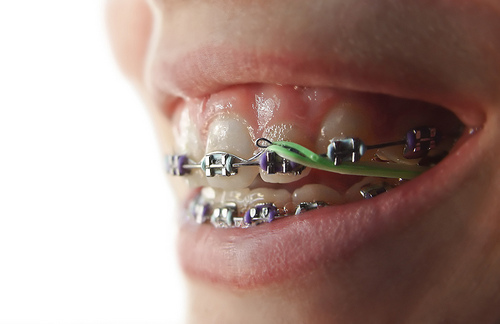
Maybe you’ve known people with braces and aligners—maybe you’ve worn them yourself!—so if braces or aligners are in your teen’s future, you have some idea what to expect and when to expect it.
But quite often, orthodontic issues require more treatment than braces alone can provide. When misalignment affects not only the teeth but the jaw as well, treatment can be more effective when it begins earlier and makes use of a different kind of appliance—the “functional appliance.”
During the years your child’s bones are still rapidly growing and forming, around the ages of eight to 14, functional appliances can help guide tooth movement and encourage jaw growth and development. One of the most widely used of these devices is the Herbst® appliance.
What does the Herbst appliance do?
There are several types of malocclusions, or “bad bites” treated by Dr. Iwei Huang. A common condition called a Class II malocclusion occurs when the upper jaw and teeth project too far forward over the lower jaw and teeth. Signs of a Class II malocclusion might include an overjet (protruding upper teeth), and/or a small or recessive lower jaw.
While correcting this malocclusion often enhances facial symmetry, which can be very important for a child’s confidence, correcting a Class II malocclusion also promotes jaw and dental health. Misaligned teeth are more difficult to clean, which can lead to decay and gum disease. Bite problems can cause persistent jaw pain and damage to the teeth. And, with an overjet, a child’s upper teeth are more at risk for injury.
The Herbst appliance was developed to treat this kind of malocclusion. It moves the lower jaw and teeth forward to create a balanced, healthy smile.
How does the Herbst appliance work?
The Herbst appliance is fixed in place with stainless steel bands or crowns that are secured to four teeth in the rear of the mouth, often the first molars on each side of the upper and lower jaws. The band or crown on each lower tooth is equipped with a small bar that extends toward the front of the mouth.
An arm on each side links the bands or crowns on the upper teeth to the front of the bar assemblies on the lower teeth. Each arm consists of a rod that fits smoothly into a tube. The telescoping action of the rod and tube allows the mouth to open and close normally. When the mouth is closed, the arms on both sides telescope shut, forming compact cylinders that hold the jaw forward.
While a child’s bones are still growing, the lower jaw’s new forward position can stimulate further bone growth and remodeling to maintain the jaw in that forward position. The Herbst appliance also has a restraining effect on the forward movement of the upper jaw. The result is a steady, noticeable improvement in the relationship between the upper teeth and jaw and the lower teeth and jaw.
Is the Herbst appliance hard to take care of?
The Herbst appliance is fairly low maintenance, but, like any orthodontic gear, it should be treated with care.
- It’s important to watch your child’s diet, because sticky, crunchy, and chewy foods can damage the appliance. Save the caramels for a post-treatment celebration!
- Carefully cleaning around the appliance is necessary, because a buildup of bacteria and plaque leads to consequences like bad breath, gum disease, and tooth decay. A water flosser can make reaching and cleaning tight spots easier if a brush alone isn’t effective.
- If the Herbst appliance is damaged, some minor fixes might be doable at home with instructions from your treatment team. But if a band or crown comes loose, or if there’s a problem you’re unfamiliar with, call our Chicago office right away.
- To help avoid the need for minor (or major) fixes, playing with the appliance with fingers or tongue, nibbling on pens and pencils, chewing on ice, or any other risky habits should be strictly off limits.
When it comes to your child’s health, you always have high expectations. Dr. Iwei Huang and our team have all the answers you’ll need about what to expect from this phase of your child’s orthodontic treatment, and just why the Herbst appliance is the very best option to create a future of attractive, healthy smiles.




